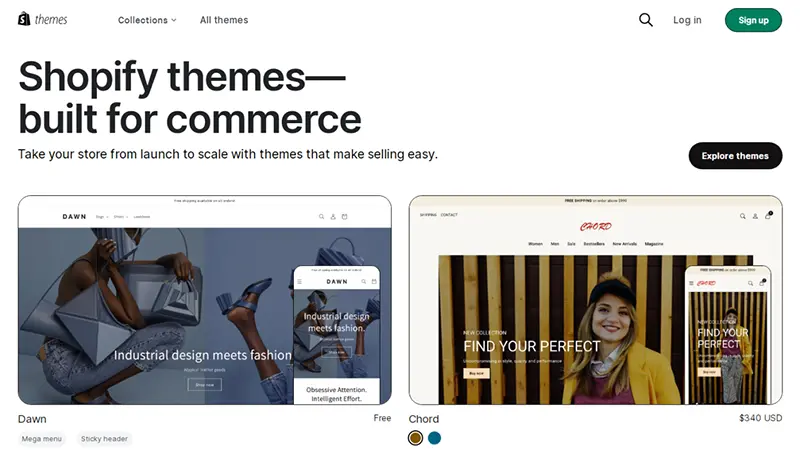
Shopify vs. Etsy: Which One Is Right for Your Business? (2026)
So, you’re ready to take the plunge and start selling your amazing creations online. However, with a million e-commerce platforms available, it is not always easy to choose one for your venture. Two famous names in the sector are Shopify and Etsy. There are pros and cons inherent to each platform.
But which one is suitable for your use? This depends on what you are selling and your general business objectives.
Therefore, we will review the main differences between selling on Shopify vs. Etsy, helping you decide which platform is best for your business.
What’s the Difference between Shopify and Etsy?
Let’s delve a bit deeper into the world of Shopify and Etsy.
Shopify
Shopify is an e-commerce platform. Opening an online store on Shopify is like having a physical store but virtually.
All the decisions are made by you; you’re the one in control. You are free to choose anything you want, from the products to sell and the prices to charge to the brand image. It’s a pretty heavy load to bear, but at the same time, it comes with full control of your own business.
This kind of freedom is one of the biggest selling points for many people starting their own print on demand businesses. The platform suits those businesses that are searching for a stable and constantly developing platform. It is more flexible, enabling you to build your unique store design, select from many themes, and install more apps for improvements.

Also, a very impressive feature of the Shopify store is that it simplifies management with its inventory management tool, payment processing tool, and shipping tool.
It also offers multichannel selling, so you have the capacity to sell on social platforms and online markets. You can even sell physically.
However, this level of control and freedom comes at a cost, and Shopify charges monthly transaction fees for its use, which might prove expensive to small business operators.
Etsy
On the other hand, Etsy is an online market with built-in site traffic, making it easy for new sellers to get started at a low cost.
Unlike Shopify, Etsy is specifically designed to sell handmade, vintage, and craft items, attracting a niche audience that is already interested in unique and creative products. This can be an advantage for entrepreneurs, as they can tap into a targeted market without requiring extensive marketing efforts.

Etsy’s platform is user-friendly, allowing you to set up your shop quickly and start selling print on demand products in no time. The platform takes care of many logistical aspects, including customer support, tracking orders, and payment processing, which can be a relief for new entrepreneurs.
However, this convenience comes with some trade-offs. Etsy charges listing fees and transaction fees, and you have less control over the design and functionality of your shop. Plus, your products will be listed alongside those of your competitors, which can be both a blessing and a curse.
In conclusion, the choice between Shopify and Etsy depends mainly on your business. Shopify offers a comprehensive, customizable solution for businesses looking to scale, while Etsy provides an easy, low-cost entry point for sellers of handmade and vintage items.
By understanding what each platform has to offer, you can make an informed decision on which one is right for your business.
Shopify vs. Etsy: Quick Overview
Let’s break down the key differences between Shopify and Etsy based on various factors:
| Feature | Shopify | Etsy |
|---|---|---|
| Product | Sell virtually any product, from physical goods to digital downloads. | Mainly focused on vintage, creative, handmade, and craft items. |
| Pricing | Shopify has tiered monthly pricing plans, starting at $29 per month, plus transaction fees. Pricing tiers vary based on features. | Listing fees of $0.20 per item, plus transaction fees. Affordable option for smaller sellers, although the fees can become substantial with higher sales volumes. |
| Ease of Start and Use | Requires more setup but offers greater customization. Can have a steeper learning curve. | Easy to set up with a basic shop. User-friendly interface for most sellers. |
| Customer Support | Offers 24/7 support through various channels including email, chat, and phone. | Provides customer support through help center and community forums. |
| SEO | Offers SEO tools and flexibility to optimize your store. | Basic SEO options are available, but competition for keywords can be fierce. |
| Design Flexibility | High degree of customization with themes and coding. | Limited design options, but you can personalize your shop within Etsy's framework. |
| Marketing Tools | Extensive marketing tools including email marketing, social media integration, and SEO. | Basic marketing features, but relies heavily on Etsy's built-in traffic. |
| Security | Strong security measures to protect your store and customer data. | Benefits from Etsy's overall security infrastructure. |
Shopify vs. Etsy: A Detailed Comparison
1. Product
Shopify
Shopify is super versatile, letting you handle a wide variety of products. Whether you’re selling physical items, digital downloads, services, or even subscriptions, Shopify can do it all within legal restrictions. This flexibility makes it a great choice for businesses with diverse product lines or those looking to expand their offerings in the future.
Basically, if you want to sell it (and it’s legal), Shopify’s got your back.
Etsy
Etsy, on the other hand, is all about handcrafted, vintage, and unique items. The platform is specifically designed for sellers who make handmade goods, vintage treasures, or craft supplies.
Buyers on Etsy are usually on the hunt for these kinds of special products, so if your business fits into these categories, Etsy can be an excellent marketplace for you.
Selling products on Etsy vs. Shopify might be better if your products are more on the creative and unique side.
2. Pricing
Deciding between Shopify and Etsy often boils down to cost. Both platforms have different fee structures that cater to different types of sellers. Here’s a breakdown of what you can expect in terms of costs.
Shopify Pricing
Shopify operates on a monthly subscription model, offering multiple pricing tiers.
- Basic Shopify ($29/month): This plan includes everything to get a new business portal: website, blog, number of products is unlimited, and support is available 24/7.
- Shopify ($79/month): This plan is designed for growing businesses, though for more fees, it includes such features as professional reports and more staff accounts.
- Advanced Shopify ($299/month): This plan is for the larger businesses that need reporting and the third-party calculated shipping rates.
- Shopify Plus (custom pricing): It’s an ideal solution for big traders and corporations because it has a rate system depending on certain requirements.
Shopify also takes commissions on transactions if you use the third-party payment processors’ solutions.
However, note that if you work with Shopify Payments, you avoid these additional charges. This can be a significant amount of difference that increases the profit, especially for big merchants.
Etsy Pricing
Etsy’s pricing structure is more straightforward and generally has a lower cost to start.
Plans will have lower fees on Etsy.
- Listing Fees: The main selling advantage on Etsy is that it charges $0.20 per item listed, which stays live for four months or at least until the item is sold.
- Transaction Fees: It presently takes Etsy 6.5% of the total revenue of the item, including the cost of delivery.
- Payment Processing Fees: These amounts differ by the region but usually consist of a fixed amount and a portion of the sale.
- Offsite Advertising Fees: Etsy charges an extra rate of commission between 12% and 15% if the sale is made from the ad posted on an offsite platform by Etsy.
Etsy also has paid services, Etsy Plus for $10 monthly. It comes with additional features that boost your business. And Etsy Pattern creates a standalone website linked to your Etsy for an additional fee.

Pricing Comparison: Etsy vs. Shopify
When comparing pricing between Etsy vs. Shopify, Etsy is more budget-friendly for small businesses and beginners. The lower initial costs make it accessible for those just starting or with limited funds.
However, as your business grows and sales volume increases, Shopify can become a more cost-effective option. The fixed monthly fees, especially with higher-tier plans, offer better value for high-volume sellers. Plus, avoiding extra transaction fees with Shopify Payments can lead to significant savings over time.
In conclusion, the choice of which is better—Etsy or Shopify—largely depends on the size and scale of your business.
3. Ease of Start and Use
When considering Shopify vs. Etsy in terms of ease of start and use, both platforms offer user-friendly experiences, but they cater to different types of users.
Shopify
Shopify features a clean, organized dashboard that is easy to navigate, even for those new to ecommerce.
The platform offers a drag-and-drop website builder, allowing users to customize their online store without needing any coding knowledge.
But starting a Shopify shop is typically more complex and time-consuming, especially if you want to take full advantage of its extensive features. The initial setup involves selecting a theme, customizing the layout, setting up payment gateways, and configuring shipping options.
While this provides a highly personalized and professional storefront, it does require a bit more effort upfront.
Etsy
Etsy is known for its simplicity and ease of use, making it an ideal choice for beginners. With pre-built templates and an intuitive interface, setting up an Etsy shop is a breeze.
The platform guides you through the process of creating your Etsy store, listing products, and setting prices. The product listing process is streamlined, allowing you to add items quickly with minimal hassle.
Additionally, Etsy’s community support is a valuable resource for new sellers, providing tips and advice from experienced members. This makes it incredibly easy to start selling without needing extensive technical knowledge.
Comparison: A Draw
In terms of comparison, it’s a draw.
Shopify offers a more comprehensive setup with greater customization options, which is excellent for those looking to build a scalable online store.
However, Etsy provides a faster, more straightforward setup process, ideal for those who want to start selling quickly without diving into the complexities of ecommerce.
Ultimately, the best option depends on your comfort level with technology and how much control you want over your store’s design and functionality.
4. Customer Support
Shopify
Shopify offers 24/7 customer support, ensuring that help is always available whenever you need it. This support includes live chat, email, and phone options.
Additionally, Shopify provides access to ecommerce experts who can offer personalized guidance on optimizing your store.
The platform’s comprehensive help center is filled with detailed articles, tutorials, and FAQs, making it easier to find solutions on your own.
Etsy
In contrast, Etsy’s customer support is not as robust. While Etsy provides a help center with useful articles and guides, as well as the Etsy Seller Handbook, forums, and newsletters, their direct support options are limited.
Etsy offers email support, but response times can be slow, and they do not provide 24/7 assistance. This can be frustrating for sellers who need quick resolutions to urgent issues.

Comparison: Shopify wins
Shopify clearly wins in the customer support category. The round-the-clock availability, multiple contact options, and access to specialized ecommerce advice make Shopify a more reliable choice for sellers who value responsive and comprehensive support.
5. SEO
When comparing Shopify vs. Etsy in terms of SEO, both platforms offer distinct advantages, but Etsy has a slight edge in terms of its built-in search advantages.
Shopify
Shopify provides a robust set of SEO tools, including the Shopify SEO App, which helps optimize your store for search engines.
Google Analytics and Google Search Console integrations allow you to track your site’s performance and make data-driven decisions to improve your SEO.
Additionally, Shopify’s blog feature and SEO-friendly URLs contribute to better search engine rankings by allowing you to create content that attracts organic traffic.
Etsy
Etsy, however, leverages its own powerful search algorithm to help products get discovered by potential buyers. This built-in traffic is a significant advantage for sellers who may not have the expertise or resources to invest heavily in SEO.
Etsy also offers Etsy Ads, which can boost product visibility within the marketplace, driving more traffic to your listings.
While Etsy’s SEO capabilities are more limited compared to Shopify’s extensive tools, the platform’s established audience and search algorithm can significantly increase product exposure without requiring extensive SEO efforts.
Comparison: Etsy Wins
Etsy takes the gold in the SEO category for sellers looking to leverage an existing audience and simplified search optimization, while Shopify offers more comprehensive tools for those willing to invest in their own SEO strategies.
6. Design Flexibility
When evaluating design flexibility between Shopify vs. Etsy, Shopify clearly stands out.
Shopify
Shopify offers both free and paid themes. These themes are highly customizable, with templates that generate HTML and CSS, giving you the freedom to tweak your site’s appearance to match your brand’s style.
Additionally, Shopify supports various third-party apps that can enhance your store’s design and functionality. From advanced visual editors to interactive features, it provides virtually limitless customization options.

Etsy
In contrast, Etsy offers much more limited design flexibility. You can personalize your shop with a banner, product photos, and a logo. The overall customization options are minimal compared to Shopify.
Etsy’s design capabilities are geared towards maintaining a consistent look and feel across its marketplace. It limits how much you can stand out from other sellers.
This simplicity is part of Etsy’s charm, but it does mean you’ll have less control over how your shop looks and functions.
Comparison: Shopify Wins
So, which is better, Etsy or Shopify?
Shopify wins in the design flexibility category thanks to the extensive range of themes and customization options. Coupled with support for third-party apps, it allows for a highly personalized and scalable store design.
Etsy, while offering a straightforward setup, doesn’t provide the same level of design control, making Shopify the better choice for those who want to create a distinctive online presence.
7. Marketing Tools
Shopify
Shopify provides robust email marketing capabilities, allowing you to drive successful targeted email campaigns.
It also integrates seamlessly with social media, enabling you to connect your store with channels like Facebook and Instagram for streamlined marketing.
Shopify’s built-in SEO optimization tools and Shopify Analytics offer valuable insights into your store’s performance and customer behavior. This helps refine your marketing strategies.
Additionally, Shopify ads and third-party app integrations expand your marketing reach even further, providing a range of options to boost visibility and drive sales.
Etsy
Etsy, while offering some useful marketing tools, is more limited in scope.
Etsy Ads can help increase the visibility of your products within the marketplace, and social media sharing options allow you to promote your shop externally.
Etsy also provides basic analytics to track your shop’s performance. However, these tools are not as extensive or integrated as Shopify’s offerings.
Comparison: Shopify Wins
Shopify takes the lead in the category of marketing tools. Its broad range of built-in features and app integrations provide a more powerful and flexible marketing toolkit, allowing you to effectively reach and engage with your audience.
8. Security
Both Shopify and Etsy offer strong protections, making the choice between Shopify vs. Etsy a draw in this regard.
Shopify
Shopify ensures a high level of security with its PCI DSS compliance, which meets industry standards for handling payment information.
The platform also provides SSL certificates to encrypt data, safeguarding sensitive customer information.
Shopify enhances security with two-factor authentication for account access, regular security updates, and built-in fraud prevention measures. It addresses potential vulnerabilities and protects against unauthorized transactions.
Etsy
Etsy also upholds robust security standards, including PCI DSS compliance to ensure safe payment processing.
Etsy provides SSL certificates to encrypt communications and two-factor authentication features.
Additionally, Etsy has comprehensive security measures in place and uses fraud prevention techniques to help protect both buyers and sellers from fraudulent activities.

Comparison: A Draw!
Both Shopify and Etsy offer solid security features for the protection of your store and customer data.
Whether you choose Shopify or Etsy, you can be confident that your online business will benefit from strong security protocols.
Bottom Line: Which One is Best for You?
Shopify is suitable for those who want to establish an online store from the ground up.
Here’s a comprehensive collection about Shopify for you to consider:
- If you require significant layout customization or a robust set of marketing tools, Shopify is quite suitable for your needs.
- The platform also has superior functionalities like detailed analysis, compatibility with a multitude of other business applications.
- High level of security that makes it suitable for growing companies looking to sustain themselves in the long run.
- Ongoing monthly fees and scalability also work well for online businesses.
- Flexibility of design and full control over the functions of the store.
Etsy is a great choice for entrepreneurial beginners, especially if they are planning to sell handmade, vintage, or unique products.
Here’s an integrated conclusion about Etsy for you to consider:
- Etsy does not require high investments and a simple setup procedure.
- It brings you to the audience interested in creative products.
- It is ideal for sellers who are just starting or wish to integrate their sales into an existing platform without having to focus on promotions.
- Etsy has basic and easy-to-understand tools.
- This site attracts a lot of visitors by itself, meaning that you will not have to spend a lot of time and money on promoting a store or product.
All things considered, it all depends on the business, kind of product you sell, and the level of operational autonomy you wish to have online.
Which Is Better Etsy Or Shopify: FAQs
1. Is it better to start with Etsy or Shopify?
Starting with Etsy is often better for beginners due to its low cost and ease of setup, especially if you’re selling handmade or unique items. Shopify is ideal for those planning to scale up with a fully customizable store.
2. Should I sell on both Shopify and Etsy?
Selling on both platforms can be beneficial if you want to reach a wider audience. Etsy can drive traffic and sales with its marketplace, while Shopify offers a personalized store experience and advanced features. Integrating both can maximize your visibility.
3. Can I sell anything on Shopify?
Shopify allows you to sell diverse products, including physical goods, digital downloads, and services, as long as they comply with legal restrictions. This flexibility makes it a versatile platform for diverse business needs.
4. Which one is best in the long term?
In the long term, Shopify is generally better due to its scalability, extensive customization options, and comprehensive marketing tools. It supports growth and offers more control over your store, making it ideal for businesses aiming for long-term success.



